Political families, India
(→The Thackeray, Pawar families) |
(→Disagreements within families) |
||
| Line 277: | Line 277: | ||
POLITICAL FAMILIES, INDIA]] | POLITICAL FAMILIES, INDIA]] | ||
| − | |||
| − | |||
| − | |||
| − | + | [[Category:India|F POLITICAL FAMILIES, INDIAPOLITICAL FAMILIES, INDIAPOLITICAL FAMILIES, INDIAPOLITICAL FAMILIES, INDIAPOLITICAL FAMILIES, INDIAPOLITICAL FAMILIES, INDIA | |
| − | + | ||
| − | + | ||
| − | + | ||
| − | + | ||
| − | + | ||
| − | + | ||
| − | + | ||
| − | + | ||
| − | + | ||
| − | + | ||
| − | + | ||
| − | + | ||
| − | + | ||
| − | + | ||
| − | + | ||
| − | + | ||
| − | + | ||
| − | + | ||
| − | + | ||
| − | + | ||
| − | + | ||
| − | + | ||
| − | + | ||
| − | + | ||
| − | + | ||
| − | + | ||
| − | + | ||
| − | + | ||
| − | + | ||
| − | + | ||
| − | + | ||
| − | + | ||
| − | + | ||
| − | + | ||
| − | + | ||
| − | + | ||
| − | + | ||
| − | + | ||
| − | + | ||
| − | + | ||
| − | + | ||
| − | + | ||
| − | + | ||
| − | [[Category:India|F POLITICAL FAMILIES, INDIAPOLITICAL FAMILIES, INDIAPOLITICAL FAMILIES, INDIAPOLITICAL FAMILIES, INDIAPOLITICAL FAMILIES, INDIA | + | |
POLITICAL FAMILIES, INDIA]] | POLITICAL FAMILIES, INDIA]] | ||
| − | [[Category:Pages with broken file links|POLITICAL FAMILIES, INDIAPOLITICAL FAMILIES, INDIA | + | [[Category:Pages with broken file links|POLITICAL FAMILIES, INDIAPOLITICAL FAMILIES, INDIAPOLITICAL FAMILIES, INDIA |
POLITICAL FAMILIES, INDIA]] | POLITICAL FAMILIES, INDIA]] | ||
| − | [[Category:Politics|F POLITICAL FAMILIES, INDIAPOLITICAL FAMILIES, INDIAPOLITICAL FAMILIES, INDIAPOLITICAL FAMILIES, INDIAPOLITICAL FAMILIES, INDIA | + | [[Category:Politics|F POLITICAL FAMILIES, INDIAPOLITICAL FAMILIES, INDIAPOLITICAL FAMILIES, INDIAPOLITICAL FAMILIES, INDIAPOLITICAL FAMILIES, INDIAPOLITICAL FAMILIES, INDIA |
POLITICAL FAMILIES, INDIA]] | POLITICAL FAMILIES, INDIA]] | ||
Revision as of 20:57, 24 March 2024
This is a collection of articles archived for the excellence of their content. |
Dynastic politics: the extent of the phenomenon
As in 2023
Chandrima Banerjee, Sep 13, 2023: The Times of India

From: Chandrima Banerjee, Sep 13, 2023: The Times of India

From: Chandrima Banerjee, Sep 13, 2023: The Times of India

From: Chandrima Banerjee, Sep 13, 2023: The Times of India

From: Chandrima Banerjee, Sep 13, 2023: The Times of India

From: Chandrima Banerjee, Sep 13, 2023: The Times of India
184 current Lok Sabha members have or had family in politicsThat’s about one-third of the Lower House. In proportion to its 301-strong numbers in the House, BJP has 86 such MPs or about 29% of its House strength. It is followed by Congress (25), DMK and Trinamool (9 each), and LJP and JDU (6 each). Just 10 parties — with the smallest numbers — don’t have any MP with family ties. They are either communist or from northeastern states with two exceptions — one Muslim-majority party and a party formed by a BJP rebel. At the other end of the spectrum, there are 12 parties whose entire representation is by MPs who have family ties to politics. Nine of them have just one MP. But the three remaining have more — LJP (6), TDP (3) and SAD (2).
Since dynastic politics is about consolidation of authority, it can be seen as an extension of monarchical rule or caste system — binding power or work to the accident of birth. In seats reserved for SC communities, just about a quarter of representatives have family ties to politics. In general category constituencies, that share is 35%. A greater share in nepotistic networks is obviously not always a sign of power — women are often fielded from seats held by their husbands or in-laws at some point, presumably to ‘hold’ that seat for the party. More than 60% of the women in Lok Sabha have family ties to politics, against the 29% among men.One part of it is the base effect — there are more men, 5.6 times more to be precise, than women and that reduces the share of the nepotistic network. Even when the numbers are really high. But it also means parties are not doing enough to get more women without political backgrounds into the field. The same logic might explain why the share of nepotistic network MPs in ST-reserved constituencies is high — 40%. Another way this shows up is in the difference in academic qualifications. Among MPs in nepotistic political networks, the share with college degrees or more is 73%. For MPs outside these networks, the share is just under 68%. Which is not to imply any correlation between education and politics but to draw attention to the many ways in which even basic things can become ‘privileges’.Because the likelihood of a citizen with limited resources holding an elected office is low, but lower still when the person is from an oppressed community. And political parties are not always willing to do the work to expand the range of backgrounds their candidates come from. This does affect policy. Because ministers are also picked from this restrictive pool. Of the 55 Lok Sabha members who are also ministers, 15 are part of nepotistic networks. And if we consider the 13 MPs who were ministers at some point in this Lok Sabha, the 17th, we add three more to the nepotism list.What does this mean for us? Earlier in 2023, Japan’s decision to skip the G20 meet in India because the foreign minister had to attend budgetary hearings in Parliament was analysed to death. Snub or sincerity, it brought up — rather briefly — the imperative to attend Parliament and do what we elect representatives for. Legislative work.If we remove the Speaker and ministers from our list of MPs, we have 166 with nepotistic networks and 304 without. This is what we found:
Less than 40% attendance: 8 among those with family ties (5%), 10 among those without (3%)
Fewer than 10 debates: 39 in the nepo network (23%), 59 in non-nepo (19%)
Zero questions: 7 nepo (4%), 10 non-nepo (3%)
So, nepotistic network MPs are only slightly behind their non-network colleagues. The same goes for continuous engagement — 115 MPs with family ties to politics (69%) and 215 MPs without (70%) asked 100 or more questions in Parliament.Even private member bills — those introduced by MPs who are not ministers — fall into this pattern. Nearly 250 introduced by nepo network MPs and 467 by non-network ones, bringing the average for both to 1.5 bills. But averages obfuscate one thing — that only a handful of MPs carry Parliament. Half the private member bills by representatives with family ties came from just 11 MPs. Among bills from those without family ties, just 18 MPs accounted for half. That leaves a staggering 119 MPs within nepotistic networks (71%) and 215 MPs without (70%) who did not introduce any private member bill at all.So, the argument is not that nepotistic network MPs are just as good as non-network ones, but that they are equally underperforming.Where the spectacular difference does lie is wealth. The Association for Democratic Reforms puts together reports based on candidate affidavits. We used its data on assets of re-contesting MPs and matched it against our nepotistic network dataset. Seats where MPs have changed or are vacant were removed. And it turns out that MPs with family ties to politics have, on an average, assets worth Rs 24 lakh more than other MPs. After a point, some of these numbers almost stop making sense. Re-contesting Karnataka MPs with family ties to politics reported a combined asset value increase of Rs 290 crore between 2014 and 2019. UP’s re-contesting Lok Sabha legislators put together an additional Rs 188 crore combined in those five years. In fact, even though the share of nepotistic network MPs among recontesting ones was just under 37%, their combined wealth exceeds that of all other re-contesting MPs by about Rs 1,164 crore. That’s more than the combined industrial development scheme allocation for Himachal Pradesh and Uttarakhand.
Chief Ministerships staying within the family
Till 2021 July
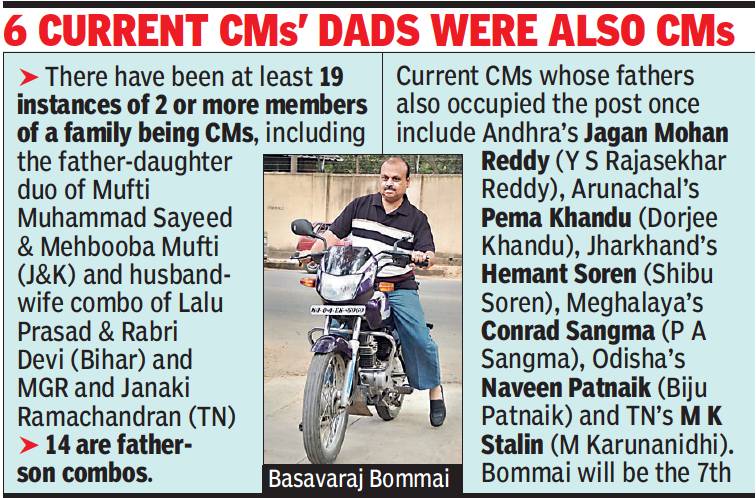
From: Anil Gejji, July 28, 2021: The Times of India
See graphic:
Chief Ministers who were parent- child or spouses, Till 2021 July
Political dynasties: the pluses, minuses
The main political dynasties of India
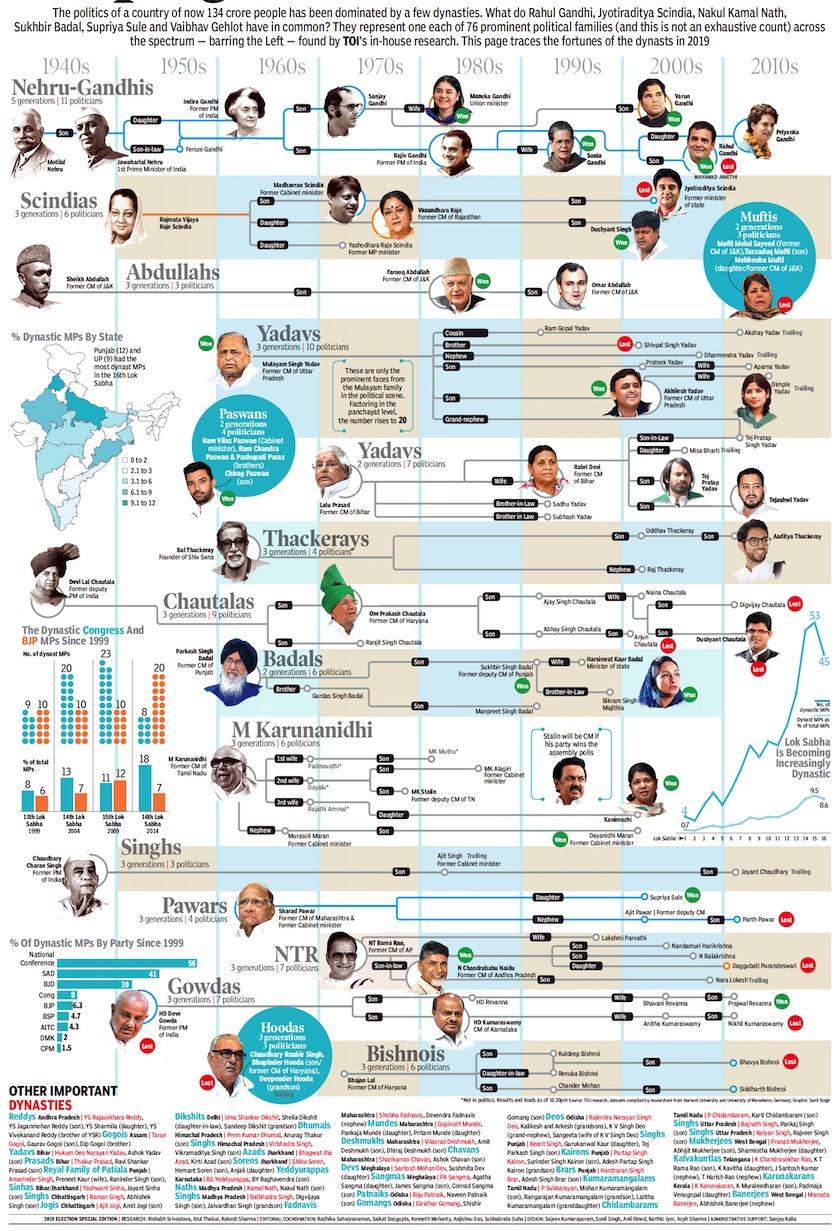
Dynastic Congress and BJP MPs, 1999-2019
From: May 24, 2019: The Times of India
See graphic, '1940s-2019: The main political dynasties of India
Dynastic Congress and BJP MPs, 1999-2019 '
2016: an NYU study

The Times of India, Aug 07 2016
New studies on India's political dynasties busts many assumptions
The Nehru-Gandhis, the Badals, the Abdullahs, the Yadavs, the Scindias -what is it about India's political soil that lets so many family trees thrive?
It's because of a lingering feudalism, say some. It is because of our easy acceptance of hereditary occupations, say others.
But though dynasties in India have been described in history and biography , the phenomenon has never been empirically analysed. A new set of data-driven and theoretically ambitious studies, led by New York University political scientist Kanchan Chandra, is the first to actually study how dynasty and democracy interact. Their book, `Democratic Dynasties: State, Party and Family in Contemporary Indian Politics', has put the skids under much of our popular wisdom.
Dynasty is a paradox, it both hurts and furthers democracy
Dynasties, as we instinctively know, are a violation of political equality because they create entry barriers to outsiders.The data shows that across parties, dynasty logic entrenches forward caste privilege. And yet, they also have collateral benefits that deepen democracy , by opening avenues for women, young people, Muslims and other social groups who don't have an easy way up our given political structures. It is not an ideal route, but dynasties seem to have worked like quotas for the representation of these groups, suggests Chandra.
Party and state set-ups, not feudal charisma encourages dynasties
Indian dynasties are a product of its democracy; former royals and feudal notables account for barely 3% across the last three Lok Sabhas. The Scindias are, in fact, an exception in how they adapted to electoral politics.Voters do not particularly favour dynasts, and they themselves frame their electoral appeals in modern terms, to convey credibility and service rather than entitlement. Also, contrary to popular fears, families do not maintain a tight grip over a constituency; only 5% of parliamentary constituen cies have been continuously represented by a dynastic MP between 2004 and 2014.Dynastic and non-dynastic MPs often switch places in the same constituencies.
So what drives the forming and strengthening of dynasties? Two things, says Chandra -the fact that political office is more attractive than ever before, and the organisational weakness of parties (the lack of clear rules in ticket al location and the assurance of loy alty in sticking with a family member). This is why, even leaders stub bornly resis tant to dynasty like Mamata Banerjee, for instance -can end up allowing it.
Dynasties are pervasive around the world; India isn't unique or extreme
With dynasts occupying 20% of the 2004 Lok Sabha, 30% of the 2009 Lok Sabha and 22% of the 2014 one, India is definitely among the more dynasty-loving nations, but it is in the same league as Japan, Iceland or Ireland, where between a third and a fourth of the legislators had helpful family connections. It is much less dynastic than the Philippines, for instance, where dynasties account for a full 50%. Countries on the lower end are Belgium, Israel, and the US, with 6 to 11%, and Canada where only 3% of the legislators were dynasts. Of course, some nations have institutionalised space for ruling families and aristocrats, like the UK, Sweden, Thailand, Zambia and so on.
Discords/ tiffs within political families
... in 10 political families/ 1911-2015
India Today April 27, 2015
Damayanti Datta
10 political family tiffs that have often turned ugly
A look at slugfests in political families that often turned disturbing
As the Gandhi vs Gandhi clamour hots up in Congress, a look at slugfests in political families that often turned disturbing.
INC President Sonia Gandhi vs son Rahul GandhI
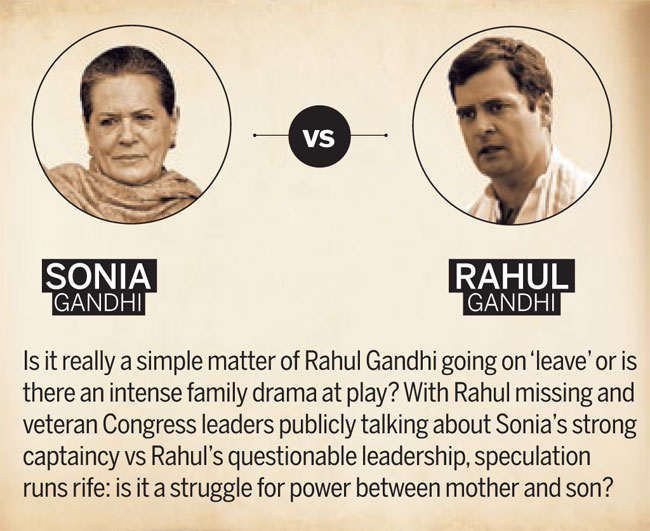
This is about Mr Rahul Gandhi's sudden, unexplained 'leave' of absence in 2015.;
From: Damayanti Datta, April 27, 2015: India Today
See graphic:
Sonia Gandhi vs Rahul Gandhi
This is about Mr Rahul Gandhi's sudden, unexplained 'leave' of absence in 2015.
Mahatma Gandhi vs eldest son Harilal Mohandas Gandhi

From: Damayanti Datta, April 27, 2015: India Today
See graphic:
Mahatma Gandhi vs Harilal Gandhi
Indira Gandhi's husband Feroze Gandhi vs Jawaharlal Nehru

From: Damayanti Datta, April 27, 2015:India Today
See graphic:
Firoz Gandhi vs Pt. Jawaharlal Nehru
Indira Gandhi vs Maneka Gandhi

From: Damayanti Datta, April 27, 2015:India Today
See graphic:
Indira Gandhi vs Maneka Gandhi
Samajwadi Party chief Mulayam Singh Yadav vs son and Uttar Pradesh CM Akhilesh Yadav
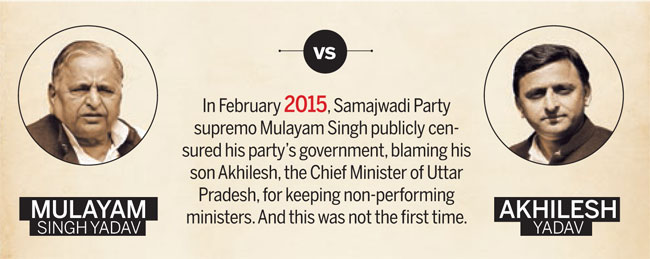
From: Damayanti Datta, April 27, 2015:India Today
See graphic
Mulayam Singh Yadav vs Akhilesh Yadav
See also Samajwadi Party
Former PM H.D. Deve Gowda vs younger son H.D. Kumaraswamy

From: Damayanti Datta, April 27, 2015:India Today
See graphic:
Former Prime Minister of India- Haradanahalli Doddegowda Deve Gowda (H. D. Deve Gowda)
Madhavrao Scindia vs mother Vijayaraje Scindia

From: Damayanti Datta, April 27, 2015: India Today
See graphic:
Scindia family
Shiv Sena founder Balasaheb Thackeray vs nephew Raj Thackeray

From: Damayanti Datta, April 27, 2015:India Today
See graphic
Thackeray family
DMK chief M. Karunanidhi vs elder son M.K. Alagiri
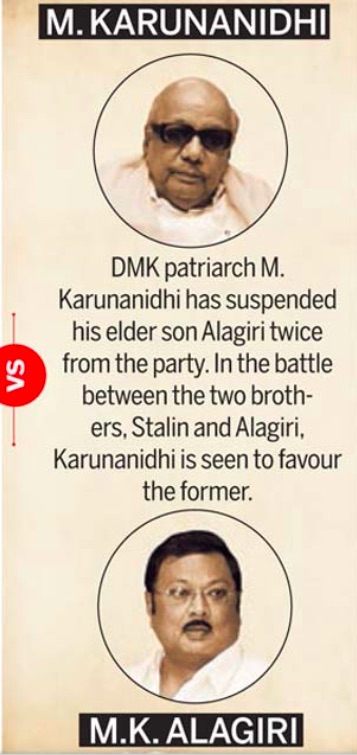
From: Damayanti Datta, April 27, 2015: India Today
See graphic
DMK family
Leader of the People's Party of Punjab, Manpreet Singh Badal vs uncle Parkash Singh Badal
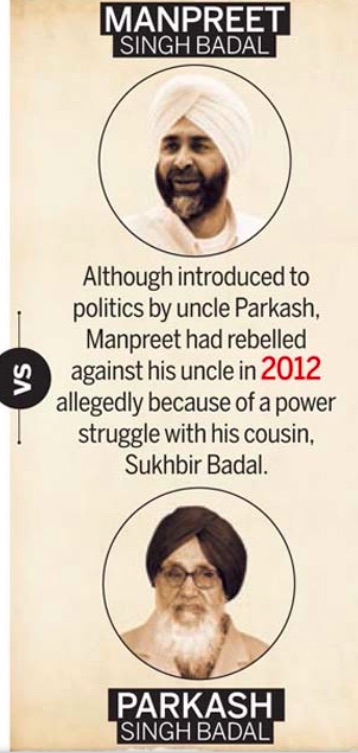
From: Damayanti Datta, April 27, 2015: India Today
See graphic:
Badal family
STATE-WISE TRENDS
Maharashtra:
The Thackeray, Pawar families

From: Nov 25, 2019: The Times of India
See graphic:
The Thackeray, Pawar families, As in 2019 Nov
B
Vaibhav Purandare, Nov 29, 2019: The Times of India
Key Highlights
Bal Thackeray always referred to Pawar as "Sharad babu" in person, their families dined together and looked after each other
Pawar played a key role in getting Sena to back Congress' Pratibha Patil and Pranab Mukherjee for President
At the time of the Sena patriarch's final illness in 2012, it was Pawar who often gave Uddhav strength
One evening in October 1966, a round-faced, portly man dressed in white plonked himself on one of the benches that draw a neat ring around Shiva ji Park in central Mumbai. He was not out for fresh air, but for a ringside view of a rally organised by Shiv Sena, a new sons-of-the-soil outfit launched by a former cartoonist, Bal Thackeray. As Thackeray launched into a tirade against migrants flocking to Mumbai in his first speech, the man on the bench, Sharad Pawar, a Congress activist from Baramati, listened intently.
Not that Pawar, who started out as a Youth Congress worker and looked up to YB Chavan as his icon, agreed with what Thackeray said. He stuck to his party's stand of "unity in diversity," but knew the ex-cartoonist was not a man to be ignored. Pawar had, in fact, first met Bal Thackeray before the Sena was formed; Thackeray's father, Prabodhankar, was a public figure who routinely attracted visitors at his Dadar residence, and Bal had developed a reputation of his own with his brushstrokes. So an acquaintance was in place.
After the inaugural Sena rally, the two travelled in different directions politically as the Sena-Congress bonhomie of the late 1960s and early 1970s - forged in their shared opposition to Communists in the city's mill heartland - ended. But a personal rapport endured, developing into a familial bond that has now enabled the late Sena founder's son Uddhav to take over the reins of the state with Pawar as mover of a three-party coalition.
Bal Thackeray always referred to Pawar as "Sharad babu" in person, though in a clear separation between the personal and the political, he dubbed him a "maidyacha pota" (a sack of flour) in speeches. Their families dined together and looked after each other. When Pawar's daughter Supriya was barely a year old, the then Congress leader and his wife Pratibha once had dinner at the Thackerays' new home, after which Pawar said he'd drive back to his hometown in Pune district. Thackeray tried to dissuade him: it was late and Supriya was small, so he urged his "dear friend" to stay back and leave in the morning. Pawar however insisted on going, and by Thackeray's own admission, he was anxious and stayed awake until he'd confirmed over phone that the Pawars had reached safely.
When Pawar, as NCP chief, decided to nominate Supriya to the Rajya Sabha in 2006, the Sena chief rang him up and told him he was annoyed because he'd heard the news from someone else. Pawar tried to explain that there was no way he could get Sena-BJP votes for her as they had their own candidates, but Thackeray persuaded BJP not to put up a saffron alliance candidate against her. "I've known Supriya as a child, and she's played with my children since she was six months old. How could I not see to it that she enters the RS unopposed?" Thackeray asked.
Pawar played a key role in getting Sena to back Congress' Pratibha Patil and Pranab Mukherjee for President, and at the time of the Sena patriarch's final illness in 2012, it was Pawar who often gave Uddhav strength.
This time, the barrier between personal and political has been breached, and Supriya Sule's tweet on Thursday showed the extent of the warmth. "Maa Saheb and Balasaheb -missing you so much today. Both of you should have been here today. They treated me with so much love and affection more than a daughter! Their role in my life will always be special and memorable!" Supriya wrote.
Maharashtra: transition and impatient scions/ 1960s-2019
GenNext's clamour for power and unwillingness to wait for it have resulted in some of Maharashtra's key political families resembling precarious houses of cards as the decks are cleared for the Lok Sabha elections.
The done thing in dynastic politics has always been for youngsters to spend some time learning the ropes in the background or on the sidelines, often in the shadow of the patriarchs. Even if ideologically, compartments ceased to be watertight decades ago, with the Pawar family of Baramati and the Vikhe Patils of Ahmednagar too going off in more than one direction, the core value of gradually climbing up the ladder was not under threat. Now suddenly it is, as a result of overarching ambition and a now-or-never attitude.
And the Pawar and Vikhe Patil dynasties are among the first to have been at the receiving end this poll season. Sharad Pawar initially made it clear he and daughter Supriya Sule would be the only two members of the family contesting the LS polls. But his nephew Ajit's son Parth pressed on, claiming the Maval seat + for himself, until Pawar Sr deftly resolved the issue and gave Parth the go-ahead while withdrawing from the fray himself. And when leader of opposition Radhakrishna Vikhe Patil of Congress failed in his attempts to wrest the Ahmednagar LS seat from NCP in his son Sujay's favour, Sujay quickly joined the BJP + .
Supriya Sule denied on Wednesday that the Parth episode had created a rift in the Pawar family. "For me and Ajitdada, family ties are of greater importance than anything else. Blood is thicker than the elixir of politics," she said.
However, some seniors are confused and distraught. "Everything is moving at a frenetic pace. A young politician wants to make it big in too short a span of time by using the family name," a senior NCP functionary said. "A young scion had to spend a couple of years by the side of the patriarch before graduating to bigger opportunities. A panchayat samiti or zilla parishad membership was the first step of the ladder," the functionary said.
The transition of power and political legacy was smooth in many political families in the 1960s, such as the Hireys of Nashik, the Vartaks of Virar, the Vikhe Patils, the Pawars, and the Chavans of Nanded. The Thackeray clan of Mumbai was the first to face open revolt by one of its young members, Raj Thackeray.
Interestingly, the number of Maharashtra leaders who showed no great interest in pushing their kith and kin into politics was impressive. Among them were Congressmen like Yashwantrao Chavan, Vasantdada Patil (his son briefly dabbled in politics before fading into oblivion) and Vasantrao Naik, and opposition stalwarts such as S M Joshi, N G Goray, George Fernandes and Mrinal Gore.
Those who were keen on handing over political legacy to their children took care to groom them. NCP veterans spoke about how Pawar Sr put his daughter through the paces when she decided to join the family vocation. Sule, now an NCP leader, said, "My father made me go from one Mantralaya department to the other with files to study the mechanism of the state administration when I took up the issue of women's empowerment. Being a member of a political family means more hard work."
Gopinath Munde would make daughter Pankaja sit next to him during media interviews or while studying papers of a complicated development issue, it is said.
The political climate began to undergo a change after Raj Thackeray's revolt against Matoshree, making Maharashtra's netas aware of GenNext's stirrings.
Even today, however, many upcoming scions are eager to hone their political skills, among them Yuva Sena chief Aditya Thackeray, Amit Thackeray, son of MNS chief Raj Thackeray and Narayan Rane's son Nitesh.
Then there are those like Milind Deora, Praniti Shinde and Amit Deshmukh of the Congress and Poonam Mahajan of the BJP who have succeeded in good measure in stepping out of their father's shadow. "But some refuse to be low-profile. An expensive lifestyle and vanity may lead to a disconnect between young politicians and grassroot workers of a party," said a political commentator.
While Sule's view is that the young generation should be encouraged to join politics, she thinks they should put their shoulder to the wheel. "They can't keep flaunting their family card," she said.
Amit Thackeray feels gone are the days when members of a political clan could "bask in borrowed glory". "Nothing wrong if a politician's son or daughter joins their father. But they will have to prove their credentials by bonding with people and not just by hankering after an MP seat or ministerial post," he said.